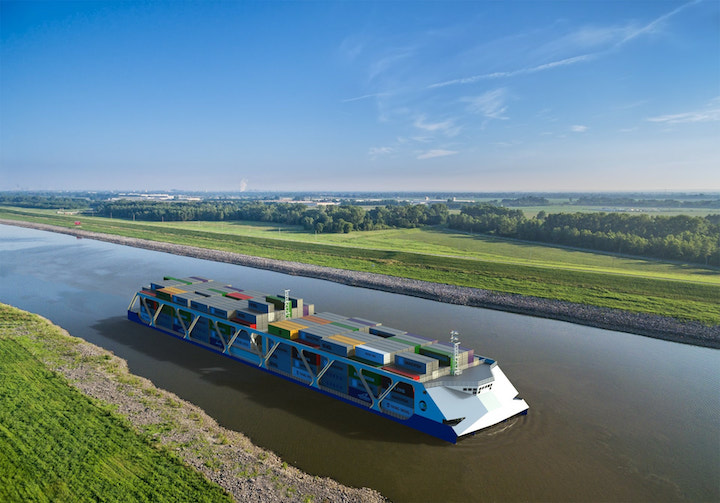A new agreement announced today could position Cairo, Illinois as a national logistics and distribution hub for the rapidly expanding intermodal container shipping industry. The agreement between the Alexander Cairo Port District, Plaquemines Port Harbor & Terminal District and American Patriot Container Transport would make the proposed Cairo river port terminal a model for 21st century inland waterway shipping and key logistics terminal for the newest inland waterway vessels that are larger, faster and more efficient than anything on US waterways today.

The Alexander Cairo Port, being developed in Illinois at the confluence of the Mississippi and Ohio rivers, and the Plaquemines Port, located at mile 50-55 on the Mississippi River, both agreed to provide intermodal container-handling services for American Patriot Container Transport’s next-generation container shipping vessels.
Plaquemines Port announced on August 13th that is developing a state-of-the-art container terminal capable of handling 22,000-TEU class container vessels moving goods to and from international markets via the Gulf of Mexico. The Cairo port would serve as a vital link between the Midwest, the new Plaquemines terminal, and global markets.
On August 4th, Governor J.B. Pritzker announced that the State of Illinois would invest $40 million in the development and construction of the Cairo port through the Rebuild Illinois capital plan. The state’s investment will allow the Cairo project to take advantage of the container shipping opportunities created by the agreement.
Container shipping plays a critical role in the global trade of items ranging from agricultural products and building materials to consumer goods. With demand for container ports projected to increase 260% by 2025, industry players are looking at Cairo, Illinois as a new option to provide faster, more reliable, cost efficient and “greener” container shipping for international trade.
“The shipping industry is evolving rapidly and creating a huge opportunity for state-of-the-art inland ports like the one being developed here in Cairo,” said Sal Litrico, CEO of American Patriot Container Transport. “We’re proud to partner with Alexander Cairo Port District as we develop a cost efficient and more environmentally friendly shipping option to help keep America more competitive in the global markets.”
“The Mississippi River is the key to unlocking the Midwest’s supply chain advantages, and the new port in Cairo will provide a direct link to the global maritime trade sector that is set to double in the next 10 years,” said Sandy Sanders, Executive Director of the Plaquemines Port Harbor & Terminal District. “We’re look forward to working with Cairo to help drive economic growth all along the Mississippi River.”
“The Alexander Cairo Port will provide a resource that American industry needs to reach national and global markets, while creating economic growth and good jobs for Southern Illinois in the process,” said Larry Klein, chairman of the Alexander Cairo Port District. “We’re honored to partner with these leaders in the industry and look forward to building a facility that is ready for the future of global shipping.”
“The Cairo port is designed to serve growing, high-value markets in order to create long-term success for all of our partners,” said Todd Ely, lead consultant for the port district and president of Ely Consulting Group. “The agreements we’re announcing today move us toward that goal and will attract a wide range of industries to Cairo.”
The Alexander Cairo Port Authority has spent years developing a new Mississippi River port terminal that would include a state-of-the-art intermodal rail design capable of handling both containers and other valued cargoes, high speed cranes and other terminal capabilities needed to support modern container shipping logistical requirements. The port will also serve as a hub for moving bulk agricultural products and other materials for domestic and global markets. Eighty percent of inland barge traffic in the U.S. passes by Cairo’s strategic location. The new port will be serviced by Class 1 railroads and several major highways and will be protected from flooding by recently reinforced levees.









